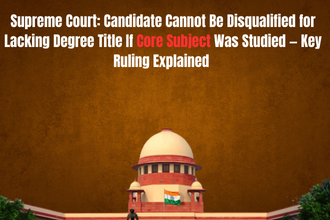In a critical judgment aimed at maintaining federal harmony and ensuring equitable water distribution, the Punjab and Haryana High Court has barred the Punjab government and its police force from interfering in the operation and regulation of the Bhakra Nangal Dam. The Court also directed Punjab to comply with the Central Government’s decision to release 4,500 cusecs of water from the dam to meet urgent needs in Haryana and Rajasthan.
The order was passed by a Division Bench of Chief Justice Sheel Nagu and Justice Sumeet Goel on a petition filed by the Bhakra Beas Management Board (BBMB), which alleged that Punjab Police personnel forcibly took operational control of the dam, thereby obstructing its regular functioning.
Background: Dam Control Dispute between BBMB and Punjab
The Bhakra Nangal Dam is one of India’s most significant multipurpose river valley projects, managed by the BBMB, a statutory body created under the Punjab Reorganization Act, 1966. It regulates water supply across Punjab, Haryana, Himachal Pradesh, and Rajasthan.
The crisis emerged when Punjab Police allegedly deployed forces to seize operational control of the dam and the Lohand Control Room, following a BBMB decision to release 8,500 cusecs of water to Haryana and other states. BBMB moved the High Court, contending that such interference violated federal norms and endangered essential services.
Court’s Directions: Protection of Federal Institutions
Taking serious note of Punjab’s actions, the High Court unequivocally restrained the Punjab government and any of its functionaries, including police, from intervening in the operations of the BBMB. The Bench ruled:
“State of Punjab and any of its functionaries, including police personnel, are restrained from interfering in the day-to-day functioning, operation and regulation of the Bhakra Nangal Dam and Lohand control Room water Regulation offices managed by BBMB.”
The Court emphasized that BBMB’s control must remain unimpeded to ensure smooth and consistent water distribution, especially during times of emergent demand.
Harsh Rebuke: “We Are Doing This to Our Enemy Country…”
During the hearing, the Bench strongly criticized the conduct of the State of Punjab. In a striking remark aimed at highlighting the gravity of the internal disruption, the Court stated:
“We are doing this to our enemy country. Let us not do this within our States.”
This comment underscores the significance of inter-state cooperation in the management of critical infrastructure like dams that affect agriculture, drinking water, and power supply across multiple states.
Additional Directions: Water Release and Central Representation
The Court also directed the Punjab government to implement the decision taken in a meeting chaired by the Union Home Secretary on May 2, 2025, to release an additional 4,500 cusecs of water from BBMB-controlled dams to Haryana and Rajasthan.
Recognizing the availability of a statutory mechanism under BBMB Rules, the Court pointed out that Punjab had failed to exercise the proper legal channel to express disagreement:
“If the State of Punjab was not agreeable to any decision taken by BBMB, it was free to make a representation to the Central Government… No such representation has been made by the State of Punjab.”
The Court added that should Punjab now make such a representation, the *Central Government shall decide on it expeditiously. This reinforces the principle that *inter-state disputes should be resolved institutionally, not through unilateral force.
Possible Paramilitary Deployment
Given the serious nature of the incident, the Court left it to the Central Government to consider the BBMB’s suggestion for the deployment of paramilitary forces to safeguard the dam against future intrusions or disruptions.
Such a move, if approved, would serve as a precautionary mechanism to ensure the security of vital water infrastructure and maintain uninterrupted operations across state boundaries.
Legal Representation
The case saw significant participation from multiple senior legal professionals:
- Senior Advocate Rajesh Garg, along with Neha Matharoo, Mandeep Singh, and RK Narwal, represented the BBMB.
- Senior Advocate Gurminder Singh, Advocate General Maninderjit Singh Bedi, and others represented the State of Punjab.
- Advocate General Pravindra Singh Chauhan, with Additional Advocate Generals Deepak Balyan and Naveen S. Bhardwaj, appeared for the State of Haryana.
- Additional Solicitor General Satya Pal Jain, with Senior Panel Counsel Dheeraj Jain, appeared for the Union of India.
Two related Public Interest Litigations (PILs) were also represented by a team of lawyers including R Kartikeya, RS Dhull, Akanksha, Sidhi Bansal, Ridhi Bansal, and Kartik Patial.
Broader Implications: A Win for Cooperative Federalism
This ruling marks a pivotal moment in the jurisprudence of inter-state water management in India. By upholding BBMB’s independent authority and directing compliance with decisions taken at the Union level, the High Court has:
- Reinforced the sanctity of statutory institutions like BBMB;
- Upheld the importance of due process and institutional grievance redressal;
- Sent a strong message against interference in federal operations by state authorities.
Future Outlook
This verdict could set the stage for greater central oversight of shared water resources, especially in a context of climate stress and increasing inter-state water disputes. It also underscores the importance of legal channels over political confrontation, particularly in sensitive issues involving essential public utilities.
The case may also prompt a re-evaluation of security arrangements at major national infrastructure facilities, encouraging stronger protocols and possibly broader deployment of neutral central forces.
Conclusion
The Punjab and Haryana High Court’s landmark ruling in the BBMB case sends a powerful message about the importance of rule of law, federal cooperation, and institutional governance. In times when regional disputes threaten national unity and essential service delivery, such interventions by the judiciary help preserve constitutional order and operational stability.
As states grapple with rising water scarcity and political tensions, the need for disciplined, transparent, and legal resolution mechanisms becomes more urgent. The High Court has not only addressed an immediate crisis but also laid down a guiding precedent for handling future inter-state disputes with dignity, legality, and fairness.


